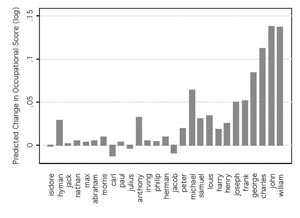Name Americanization Pays, Study Finds

Effect of Name Americanization on (Log) Occupational Score, by Name<br>Source: IZA Discussion Paper No. 7725 <br>
A new study published by the Bonn-based Institute for the Study of Labor (IZA) explores beyond such anecdotes, providing solid evidence on the magnitude and consequences of this phenomenon.
In a sample of migrants who naturalized to become American citizens in 1930, the authors find that a third of European migrants abandoned foreign-sounding names to adopt a popular American name. This widespread practice paid off: Migrants who Americanized their names achieved higher economic success than those who did not.
Digging through thousands of 1920s naturalization papers from New York City, the authors track a wide range of characteristics of more than 3,000 migrants naturalizing by 1930. Since migrants had to fill out two separate documents for the naturalization procedure, their characteristics can be observed over time. The authors' conclusions are based upon comparing migrants' economic success over time, between those who kept their original name and those who chose more American names.
The study shows that migrants who changed their name into popular American names such as William, John or Charles, earned at least 14 percent more than those who changed into less popular names (see figure). Name Americanization was more common among migrants who were likely low skilled, more discriminated against, or with less alternative means for socio-economic improvement.
“These findings are not only informative for Europe and the United States' historical memory of the period, but also show that migrants faced an important tradeoff between individual identity and labor market success in the early making of modern America,” says IZA Research Director Corrado Giulietti. His co-author Costanza Biavaschi adds, “Despite migrant occupational upgrading being limited at the time, migrants adopted various strategies to climb the occupational ladder. We discovered that name Americanization is an effective but under-explored strategy.”
The analysis also considers the possibility that the choice of a new name reflected other factors related to migrants' experiences that could have also had an impact on economic success, such as differing levels of ambition or language acquisition. To isolate the economic payoff resulting from having a new name from that attributable to other factors, the authors note that migrants with names of certain linguistic complexity – measured by the Scrabble points of the name when arriving in the U.S. – decided to Americanize their names irrespective of other motivations. Using this strategy, the authors confirm that the name change as such caused better economic performance.
Download the study free of charge:
Costanza Biavaschi, Corrado Giulietti, Zahra Siddique
“The Economic Payoff of Name Americanization”
IZA Discussion Paper No. 7725
http://ftp.iza.org/dp7725.pdf
Contact:
Costanza Biavaschi
E-mail: biavaschi@iza.org
+49 (228) 3894-161
Media Contact
More Information:
http://www.iza.orgAll latest news from the category: Studies and Analyses
innovations-report maintains a wealth of in-depth studies and analyses from a variety of subject areas including business and finance, medicine and pharmacology, ecology and the environment, energy, communications and media, transportation, work, family and leisure.
Newest articles

Nerve cells of blind mice retain their visual function
Nerve cells in the retina were analysed at TU Wien (Vienna) using microelectrodes. They show astonishingly stable behavior – good news for retina implants. The retina is often referred to…

State-wide center for quantum science
Karlsruhe Institute of Technology joins IQST as a new partner. The mission of IQST is to further our understanding of nature and develop innovative technologies based on quantum science by…

Newly designed nanomaterial shows promise as antimicrobial agent
Rice scientists develop nanocrystals that kill bacteria under visible light. Newly developed halide perovskite nanocrystals (HPNCs) show potential as antimicrobial agents that are stable, effective and easy to produce. After…



